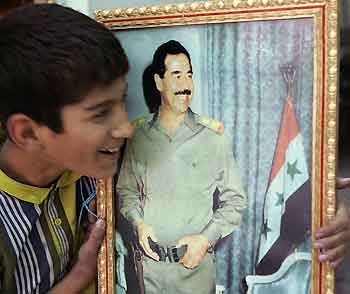|
Saddam pleads innocent, gets into scuffle
(AP)
Updated: 2005-10-20 07:43
The chief prosecutor, Jaafar al-Mousawi, outlined the case against the men,
saying Saddam was closely involved in planning retaliation after an
assassination attempt against him as he drove through Dujail in July 1982.
Al-Mousawi said the prosecution had videos of Saddam personally interrogating
four Dujail residents soon after his motorcade was fired on.
Saddam countered that videotapes should not be admissible as evidence,
insisting they can be altered and faked. The judge did not respond to his
argument.
Prosecutors have said that they brought the Dujail case against Saddam first
— rather than more notorious atrocities that killed far more people — because
they had more solid, easy-to-gather evidence on Dujail, including documents and
videos showing the then-leader's role.

A young Jordanian holds up a poster of former
Iraqi President Saddam Hussein for sale in downtown Amman October 19,
2005.[Reuters] | Saddam's co-defendants include his former intelligence chief Barazan Ibrahim,
former vice president Taha Yassin Ramadan, the former Revolutionary Court head
Awad Hamed al-Bandar and four lower-level Baathist civil servants from the
Dujail region.
Wednesday's back-and-forths evoked the war crimes trial of former Yugoslav
President Slobodan Milosevic, accused of committing atrocities during his rule
in the Balkans in the 1990s. Like Saddam, Milosevic has argued with judges and
denied the court's legitimacy.
While Milosevic is being tried at a U.N. war crimes tribunal in The Hague,
Netherlands, Saddam is facing a tribunal of his own people. The Iraqi tribunal
is partly funded by the United States and organized by a government dominated by
Iraqi ethnic groups he once oppressed.
The trial comes nearly two years after Saddam's capture on Dec. 13, 2003,
when U.S. troops that had overrun Baghdad the previous April finally found the
fugitive leader, hiding in a cellar in a rural area outside his hometown of
Tikrit north of Baghdad.
|